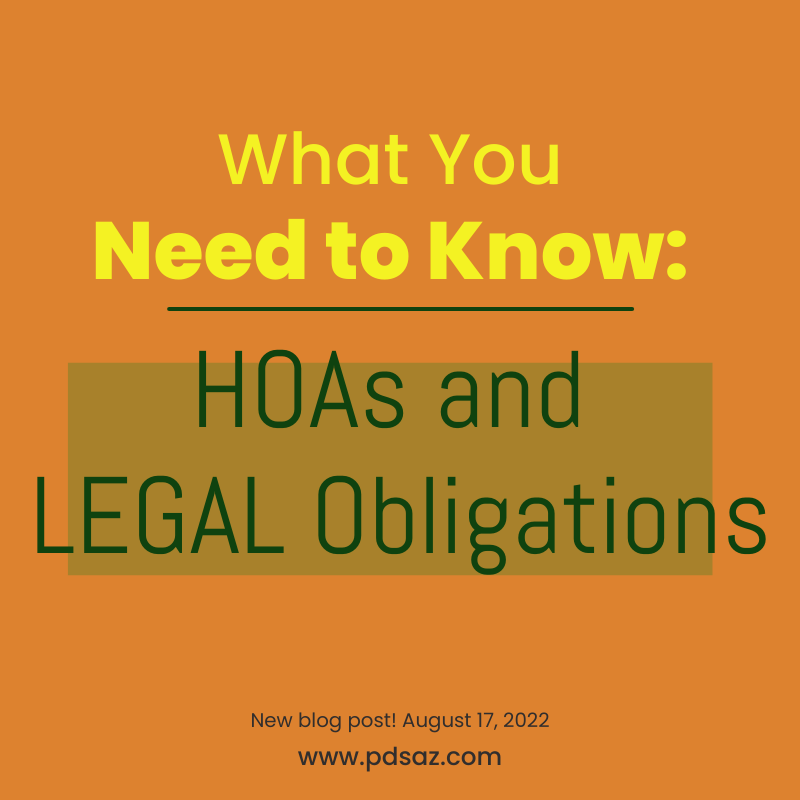
What You Need to Know: HOAs and Legal Obligations
There are over 70 million people in nearly 350,000 communities in the United States who are members of HOAs and remarkably, their daily lives may be impacted by their HOA Boards far more than by their local, county, state, or even federal governments!
Because HOAs and their Boards can exert such an influence over community members’ lives, it is important to understand what they are legally required to do and what they are prohibited from doing. And that requires understanding what HOAs even are in the first place.
What Exactly Is an HOA?
If you buy a home, condo, or townhouse, you may find that it exists within a homeowners association… which is most often (but not always) a nonprofit organization. The homeowners association or HOA is overseen by a Board whose members belong to the community and who are elected by the property owners within that community.
The Board exists to make and enforce rules that ensure a safe and orderly community for the residents. These standards usually involve things such as how many vehicles can be parked at each residence, pet ownership and responsibilities, what types of changes can be made to the exterior of homes (including restrictions on paint colors), and how long visitors may remain in the community for any given time.
The HOA is also responsible for maintaining the common areas of the community like parks, pools, and playgrounds; and, for keeping up the roads, lighting, and sidewalks within the community. All of these responsibilities are funded by the HOA fees and dues paid by the community’s property owners. The HOA may also collect fines from community members who violate any of the community rules.
What Legalities Are Involved When It Comes to HOAs and Their Boards?
Although the most states have similar laws for HOAs and HOA Board members, if you have a specific question regarding Arizona laws governing HOAs, you can contact a practicing real estate attorney for specific information. Although we cannot provide legal advice, PDS is also always available to provide any information you may need.
That having been said, in general, even though most HOA Board members serve on a voluntary basis and do not receive any sort of compensation for their services, Board members can be held legally responsible if they violate any of their fiduciary obligations. Such duties include, but are not limited to the following:
- Authority: HOA bylaws and state law define the scope and limits of a Board member’s authority. It is never appropriate for a Board as a whole or an individual Board member to try to bypass the restrictions or the rights of individual homeowners within the association.
- Care: Duty of care means that a Board member must be reasonable and prudent in carrying out their responsibilities. They must be knowledgeable about the rules and governing documents of the HOA and must avoid making decisions or taking actions that are impulsive, erratic, or arbitrary.
- Loyalty: Duty of loyalty requires that a Board member act in the best interest of the community as a whole and never for their own benefit alone. When a Board member has a conflict of interest, they have an obligation to recuse themselves from voting or acting on that particular issue.
What If Laws Are Broken?
If an HOA or its Board has broken the law or failed to meet their legal obligations, they can be held liable. That legal action can come from members of the HOA or from any applicable government agencies.
In addition, if an individual HOA Board member has violated their fiduciary responsibilities in any way, they can face prosecution under criminal laws or find themselves in a civil lawsuit brought on behalf of the HOA and its members.
Obviously, understanding their legal responsibilities and being aware of the bylaws and state regulations governing any individual HOA is the best way for homeowners associations and their Board members to avoid any sort of legal entanglements or lawsuits. Again, PDS is here to provide any information you may need in terms of governing documents and state laws or to point you in the right direction should you need further clarification.
